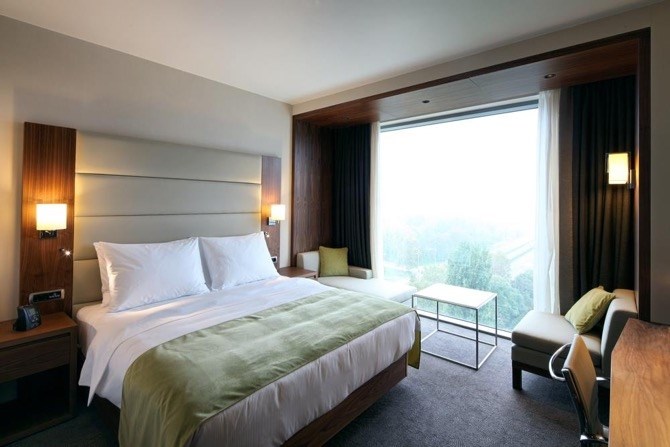
Image Credit: Shutterstock
May 30, 2022 - 6:00 AM
As with every other commodity, the price of hotel rooms in B.C. has been hit by inflation.
But there’s more behind the increase in room rental rates this year – rates that may jump dramatically in the coming months.
“We’re seeing much stronger growth in areas like the Thompson-Okanagan and other resort locations,” Laura Baxter, Canadian director of hospitality analytics for STR – CoStar Hospitality, told iNFOnews.ca. STR is an international company that compiles statistics for the hospitality industry.
Room rental rates in the region averaged $116.31 per night in April 2019. They dropped off dramatically during the pandemic – as low as $98 last year – but have rebounded to $138.55 this April. That’s a 19% increase over 2019.
B.C., as a whole, saw April 2019 rates of $173.01 climb to $186.21 this year, an increase of only 7.6%, which is still faster than most areas in the world, Baxter said.
Averages, of course, don’t tell the whole story since different properties and locations can vary dramatically in price. The reasons for those difference reflect how different regions of the province were affected by the pandemic.
“Urban centres suffered much more in the early days of the pandemic whereas locations like the Thomson-Okanagan did much better,” Baxter said. “Those drive-to locations, like the Thompson-Okanagan, with large urban populations nearby, had people trying to escape from larger cities during the early days of the pandemic.”
There were actually times during the summer months of the pandemic when Thompson-Okanagan room rates were above the B.C. average, which is heavily influenced by the massive Vancouver market.
In August 2020, for example, the average room rate in the region was $186.29 while the B.C. average was only $169.64.
Now, with the huge pent-up demand for travel, the Thompson-Okanagan is bouncing back and can afford to charge higher room rates, especially given inflationary pressures.
“We’re seeing much stronger growth in areas like the Thompson-Okanagan and other resort locations,” Baxter said. “People are now confident and able to travel. There’s no mask mandates. The pandemic is in a different phase now so people who have missed out on those trips are now wanting to travel and there are very few restrictions on travel. Definitely, in the short term, that’s going to keep the industry in very good condition throughout the summer and likely beyond.”
That’s meant, anecdotally, some very steep price increases and room shortages in places like Kamloops, where one traveller reported a 75% increase in rates in May compared to April.
“Typically, in a normal year, it would go up 15% month over month, in B.C., on average,” Baxter said. “There is upward momentum in terms of rates but there also could be an event that’s taking place in that location.”
Ray Dhaliwal, who is running for mayor of Kamloops, posted on his Facebook page that he’s heard there are so many sports teams coming to Kamloops this weekend that some are forced to book rooms in Vernon because of shortages in Kamloops.
Another factor affecting vacancy rates is that the sheer number of hotel rooms is down. Through the pandemic, provincial and federal governments bought many older motels and converted them to housing for homeless or low income people.
READ MORE: B.C. Housing buys Fortune Motel in Kamloops
That’s compounded by the fact that, being hit so hard in the early days of the pandemic, new hotel building projects, such as a proposed 33-storey tower in Kelowna, were simply stopped.
Other construction projects have been slowed by labour shortages and supply chain issues.
READ MORE: COVID stalls major Kelowna waterfront hotel project
While the hotel industry in tourist areas like the Thompson-Okanagan seems to be headed for a very good summer, larger centres like Vancouver are picking up as well.
“In urban locations, we’re seeing a resurgence in corporate demand and group demand, which were two segments that were lagging,” Baxter said. “There’s more reason to go to cities. There’s more events taking place. There’s more corporate travel. There’s more international travel.”
And, while it may seem counterintuitive for the industry to raise rates while they're still trying to recover from pandemic losses, they did learn one key lesson during that time.
“I think hoteliers realize that cutting rates wasn’t going to generate demand in the pandemic because people were staying home because they weren’t confident to travel,” Baxter said. “It’s incredible to think that the industry has bounced back this quickly because there has been no rate discounting, compared to previous downturns. In the early days of the pandemic, everyone thought the pandemic recovery was going to be much longer but, indeed, depending on the market, it’s been somewhat faster.”
And, while staffing shortages during the pandemic forced some properties to close entire wings to guests, this coming busy summer season was anticipated. While there are still shortages, operators had more time to recruit and hire so are better prepared to return to full occupancy.
To contact a reporter for this story, email Rob Munro or call 250-808-0143 or email the editor. You can also submit photos, videos or news tips to the newsroom and be entered to win a monthly prize draw.
We welcome your comments and opinions on our stories but play nice. We won't censor or delete comments unless they contain off-topic statements or links, unnecessary vulgarity, false facts, spam or obviously fake profiles. If you have any concerns about what you see in comments, email the editor in the link above.
News from © iNFOnews, 2022